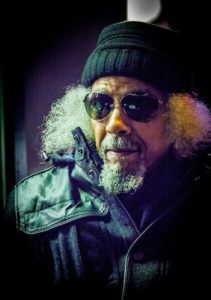
Jalal Mansur Nuriddin
*Jalal Nuriddin was born on this date in 1944. He was a Black poet and musician. Jalaluddin Mansur Nuriddin was born Lawrence Padilla in the Fort Greene housing project in Brooklyn, New York. As a youth, Nuriddin ran with a local gang, the Fort Greene Chaplains; they fought a street rivalry with the Bed-Stuy Bishops from further up on Myrtle Ave, which ran through both neighborhoods. He was incarcerated during this period.
He became a Muslim, poet, acupuncturist, and martial arts exponent (a practitioner of a form of Bak Mei); he was given an early release on condition that he join the US Army, where he trained as a paratrooper but was imprisoned again while in the Army for refusing to salute the American flag. However, he received an honorable discharge and went to work for a bank on Wall Street. As an artist, after serving his country, he used the names Lightnin' Rod and Alafia Pudim. Called "The Grandfather of Rap," he was one of the early members of The Last Poets, a group of poets and musicians that evolved in the 1960s out of the Harlem Writers Workshop in New York City.

The Last Poets signed to Douglas Records after Jimi Hendrix producer Alan Douglas heard them perform on a basketball court in Harlem, a prelude to what later became block parties associated with DJ Kool Herc, where rap was mixed with DJing to coalesce the hip-hop sound that the Last Poets initially forged. Douglas released their self-titled first album to critical acclaim in 1970, with the hit record "Niggers Are Scared of Revolution" written by Umar Bin Hassan, establishing the Last Poets as the artistic vanguard of the 20th-century American Civil Rights movement.
There was a thirst for racial direction in the wake of the deaths and incarceration of many black activist leaders in America, such as Malcolm X, Martin Luther King, and the Black Panthers. Many turned to the Black Arts Movement for guidance from political leaders in the early 1970s. Another such luminary was the young Gil Scott-Heron, who met Nuriddin and the Last Poets when they performed at Lincoln University, where he was studying. Heron wrote his seminal piece The Revolution Will Not Be Televised in response to the Last Poets 'When the Revolution Comes' from their first album. Nuriddin's experience as a stenographer at a Wall Street bank inspired his poem "E-Pluribus Unum" from 1973's Chastisement.
His writings are examples of American racial intersectionality from within the minds and souls of African Americans. Nurddin also recorded another jail toast with Jimi Hendrix called Doriella Du Fontaine, which he refused to release after Hendrix’s death because he “didn’t want to capitalize on Jimi.” However, Douglas released it in 1984 under Jalal’s alias, Lightnin’ Rod. Jalal Mansur Nuriddin died on June 4, 2018.